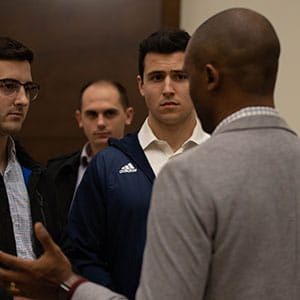Remember the saying “stranger danger,” used to quickly remind people not talk to strangers? The same idea holds true with technology. Strange Wi-Fi? Don’t connect. Strange e-mail? Don’t engage. In this day and age, people can be blinded by the benefits of technology, unknowingly leaving themselves vulnerable to cyberattacks at home or at work.
 Students and attendees interact at Endicott's
Students and attendees interact at Endicott's
"Cybersecurity & the Corporate World" event.
The “Cybersecurity & the Corporate World” event panel on Wednesday, November 20, co-hosted by Endicott College's Homeland Security Studies program and the College’s Internship & Career Center, discussed the threats businesses are facing, how companies are confronting these attacks, and how to best avoid cyberattacks. The panel consisted of FBI Agent Scott McGaunn, CEO and Founder of Evee Security Consulting Group Gary Evee, and Regional Cybersecurity Advisor for New England at Cybersecurity Infrastructure Security Agency (Department of Homeland Security) Ronald Ford. The panel was facilitated by Eric Reiners, CIO for Rapid7, a security analytics company focused on helping clients find, fix, and resolve cyberattacks. This impressive group shared their experience in the industry, providing helpful facts on cybercrime and tips on preventing cyberattacks.
Here are the five biggest takeaways from the talk:
1. Trust nobody: Never use public Wi-Fi and watch out for “spoofed” Wi-Fi.
There is no assurance that a public Wi-Fi server came from a trusted device. By connecting to a public Wi-Fi, one subjects themselves to viruses and potential threats that could, in the long-term, compromise business intelligence. Evee says, “ask yourself; am I connecting to a Wi-Fi that is actually the Wi-Fi source network?” Watch out for a “spoofed” Wi-Fi, disguised in name as a secure network and waiting for unsuspecting Wi-Fi users connect, leaving data vulnerable.
2. Hackers target Generation Z, as they are assumed to be oblivious to the dangers.
Younger generations are more willing to use technology, social media, apps, and online communication, which leads to constant information-sharing. Hackers see this casual use and high volume as an easy target. It is easier to put a virus on their computer or steal and wipe out data.
3. You may not even know you were hacked until months later.
Hackers are smooth criminals. A cyberattack typically take six months to succeed; for a majority of those six months the hacker stays dormant, watching users’ behavior and patterns. This is similar to street crime, like casing a location before a robbery attempt.
4. A password is everything and is your security wall.
Just like a key is to your home, a password is a key to your intellectual property. According to McGaunn, bad password security is when you write them down; passwords are most secure when they are in your head, not on your devices or written on paper.
5. Tech savvy vs. tech dependent, what’s the difference?
Today’s younger generations believe they are “tech savvy” as they know how to use a multitude of technological devices, but what they really are is “tech dependent.” Reiners gave the example of his kids: “If YouTube is down, to them it means that the internet is broken.” Reiner states how “tech savvy” people are not the ones who can navigate the hottest device out there, but the ones who can understand how code or a device really works.
A lucrative and long-lasting career awaits in cybersecurity
With 9,000 cyber-related jobs currently available in Massachusetts alone (and a projected 3.5 million unfilled cybersecurity jobs globally by 2021*), the industry is worth consideration by any college students, even those without a technological background. The experts offered advice on pursuing a career in cybersecurity:
Scott McGaunn
- “Watch your social media footprint—what you put online stays there forever.”
- Employees look at a candidate’s social media presence and based on what they find that could mean the difference between a yes or a no.
- Cybersecurity is the future and will become a baseline skill to have.
Gary Evee
- “You need to be inquisitive. Showcase that you are a self-learner.”
- “If I ask you, ‘what are you working on?’ Never say, ‘nothing.’ You should always be working on some kind of cyber-related project as that shows me you are passionate.” If you don’t have a project find yourself one and wrap yourself around it.
Ronald Ford
- “Curiosity is what I look for as that tells me that you have a certain mindset and a certain energy.”
- “I might ask you: ‘What is your fit into the cybersecurity landscape?’ No matter your background, getting involved in a cyber project or community group will speak volumes to employers.”
* CyberCrime Magazine
If you think cybersecurity is the career path for you and want to learn more, take a look at Endicott's Master of Science in Homeland Security Studies, or Certificate in Cybersecurity. The Fifth Year program offers Endicott students a 20 percent tuition savings on the master’s degree.


